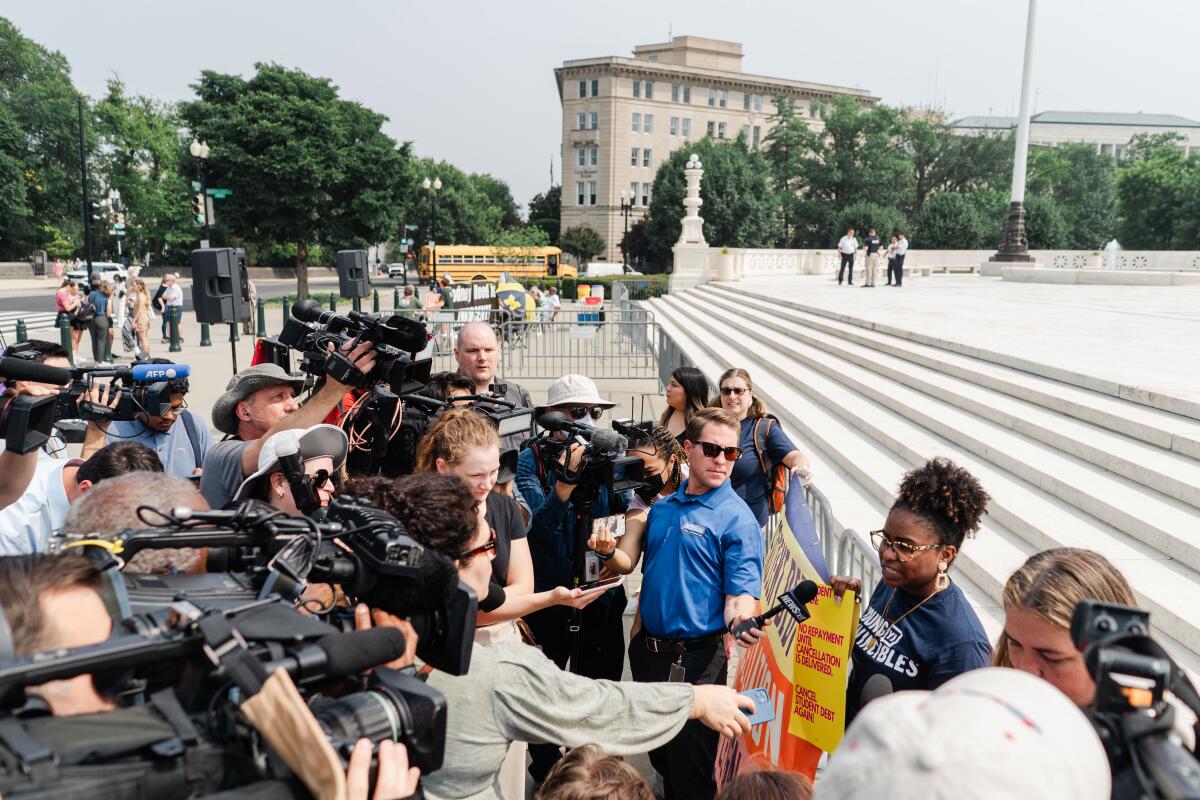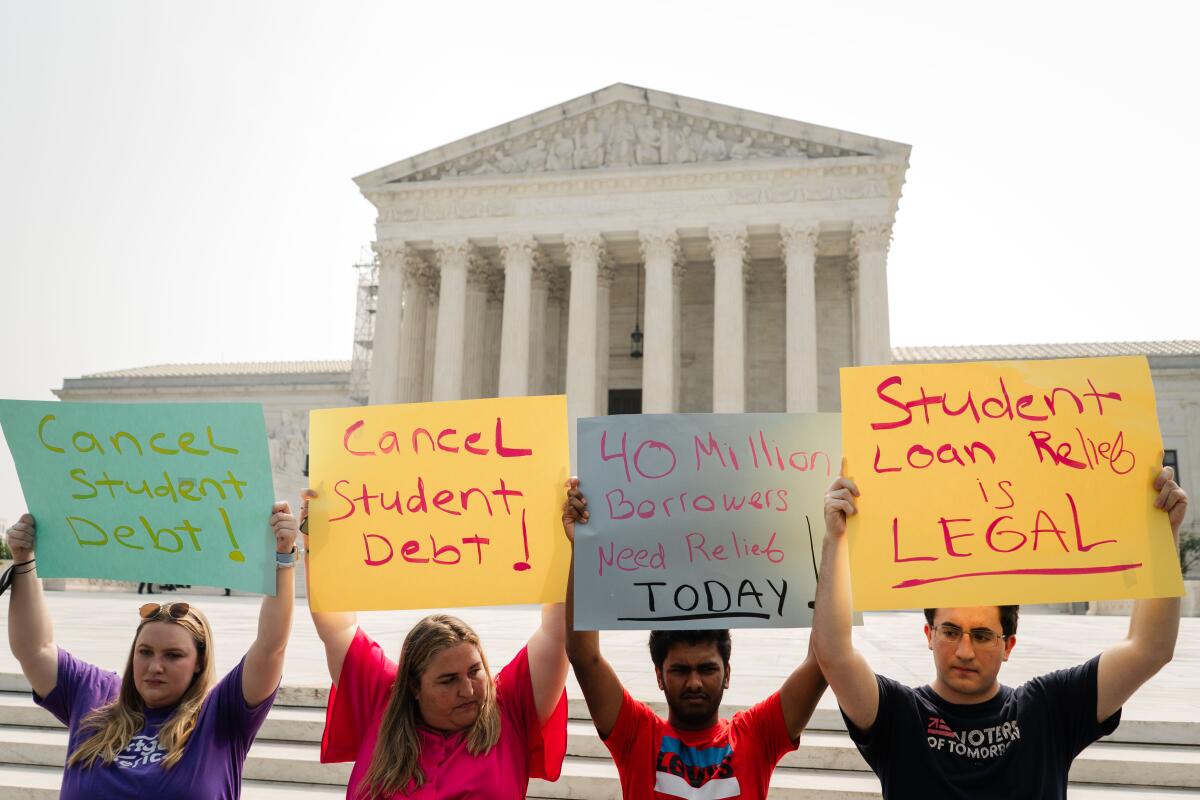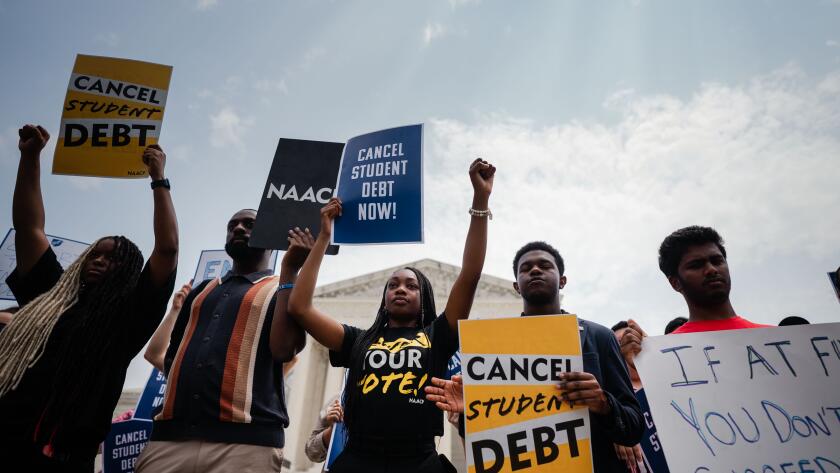Supreme Court strikes down Biden’s plan to forgive millions of student loans
- Share via
The Supreme Court has ruled that President Biden does not have the authority to forgive millions of student loans.
- Share via
WASHINGTON — The Supreme Court on Friday rejected President Biden’s plan to forgive millions of student loans, ruling that the nation’s chief executive does not have the legal authority to waive more than $400 billion owed to the government.
The Biden administration had asserted its right to cancel the loans as part of its emergency response to the COVID-19 pandemic and under a 2003 law called the HEROES Act, passed at the time of the Iraq war.
In a 6-3 vote in Biden vs. Nebraska, the court’s conservatives said only Congress could authorize such a large- scale cancellation of government-provided loans.
Writing for the conservative majority, Chief Justice John G. Roberts Jr. said: “The HEROES Act allows the Secretary [of Education] to ‘waive or modify’” provisions of the student aid laws, “but does not allow the Secretary to rewrite that statute to the extent of canceling $430 billion of student loan principal.”
The court’s conservatives are highly skeptical of government agencies that claim the power to make major changes in the law or to spend large sums of money without the approval of Congress.
Roberts called the cost and scope of Biden’s plan “staggering by any measure.” He cited a University of Pennsylvania study that estimated the plan would “cost taxpayers ‘between $469 billion and $519 billion,’ depending on the total number of borrowers” it covered.

In dissent, liberal Justice Elena Kagan wrote: “In every respect, the Court today exceeds its proper, limited role in our Nation’s governance. ... The result here is that the Court substitutes itself for Congress and the Executive Branch in making national policy about student-loan forgiveness.”
She argued that Congress had indeed authorized waiving student loans in the face of a national emergency, and that it was the conservative justices who were rewriting the law.
In response, Roberts fired back: “The dissent is correct that this is a case about one branch of government arrogating to itself power belonging to another. But it is the Executive seizing the power of the Legislature.”
Biden said Friday that he strongly disagreed with the court’s decision. He vowed to keep fighting, and announced that he would reintroduce large-scale student debt relief by invoking a different law.
Advocates of forgiving student loans argue that the Higher Education Act of 1965 gives the U.S. secretary of Education broad authority to “compromise, waive or release” students’ federal debts.
Speaking to reporters Friday, Biden declined to offer further details about who would qualify or how much relief borrowers would receive under his new plan, but said he believed it was “the best path that remains to provide for as many borrowers as possible.”
“Today’s decision has closed one path,” he said. “Now we’re going to pursue another.”
The president also announced plans for a 12-month “on ramp” repayment program for borrowers who may not be able to afford payments when they resume this fall. The program would temporarily remove the threat of default or of harming a borrower’s credit, he said.
The heavy burden of student loans had become a major issue for Democrats.
As a candidate in 2020, Biden promised to forgive up to $10,000 in student loans for many young borrowers, but he did not seek legislation on the issue from Congress when it was under Democratic control.
Last year, with the end of pandemic in sight, he joined Education Secretary Miguel Cardona to announce that the government — as part of its COVID-19 response — would forgive $10,000 of most outstanding student loans, and up to $20,000 for borrowers from low-income families.
About 26 million borrowers applied for relief.
But the policy’s legal status remained in doubt. The HEROES Act says the Education Department may “waive or modify” any provision of government-funded student loans for any borrower affected by “a war or other military operation or national emergency.”

Lawmakers said at the time that their aim was to extend temporary relief to those who were called to serve in Iraq, and to make sure they were not “in a worse position financially” due to their service.
In March 2020, President Trump declared a national emergency in response to the COVID-19 pandemic, and his administration suspended the required payments and accrued interest on outstanding students loans. These suspensions remain in effect and have cost the government more than $100 billion.
Biden decided to go further, saying the cost of higher education had skyrocketed and left many students with crushing debts. The White House said his plan to forgive some or all of millions of loans would “provide more breathing room to America’s working families as they continue to recover from the strains associated with the COVID-19 pandemic.”
But attorneys for Nebraska and five other Republican-led states sued over the plan, arguing the president was “unlawfully invoking the COVID-19 pandemic to assert power beyond anything Congress could have conceived.”
In defense of the plan, the Biden administration’s lawyers said Congress had indeed authorized the Education Department to “waive or modify” any provision of the student aid programs. The attorneys also argued that the states had no standing to sue because they were not harmed by the president’s decision to forgive loans.
But a federal appeals court in St. Louis sided with the Republican-led states and blocked the loan cancellation program from taking effect. In December, the Supreme Court refused to lift that order, but agreed to hear the administration’s appeal in late February.
Led by Roberts, the court’s conservatives said they were highly skeptical of the notion that the 2003 law or the pandemic gave the administration authority to wipe away millions of loans.
On Friday, the justices said the state of Missouri had standing to sue because its higher education financing agency would lose an estimated $44 million in fees if the loan forgiveness took effect.
“This financial harm is an injury in fact” and gives Missouri standing to sue, Roberts said.
Times staff writer Courtney Subramanian contributed to this report.
More to Read
Get the L.A. Times Politics newsletter
Deeply reported insights into legislation, politics and policy from Sacramento, Washington and beyond. In your inbox twice per week.
You may occasionally receive promotional content from the Los Angeles Times.












